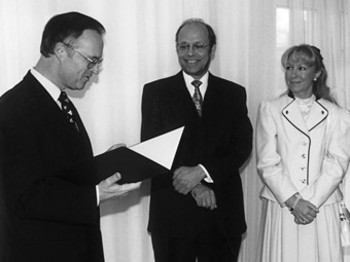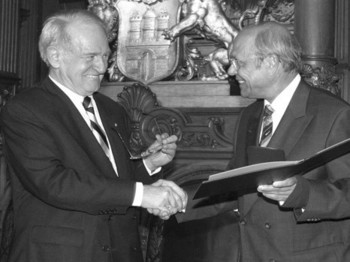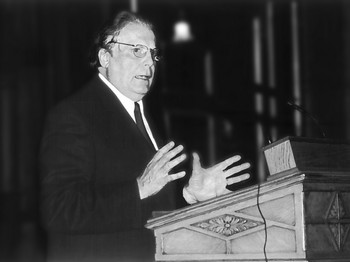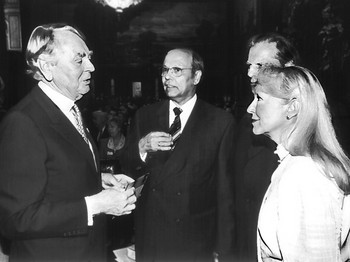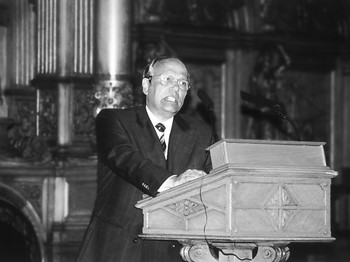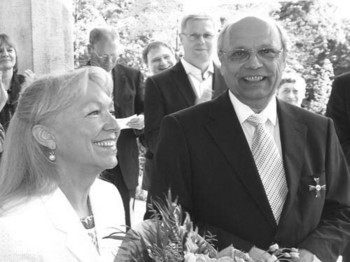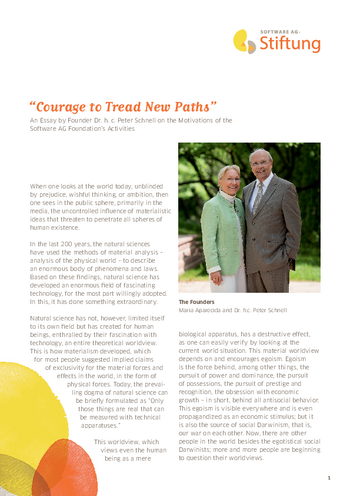Founder & Foundation
The Software AG Foundation (SAGST) is an independent charitable foundation under German civil law with headquarters in Darmstadt, Germany. We are not a corporate foundation; rather, the foundation is the principal shareholder in the Software AG company, also located in the research town of Darmstadt. The founder of both, the company and the foundation, is Dr. h. c. Peter Schnell, who transferred all company shares to the foundation in the 1990s.
About the Founder
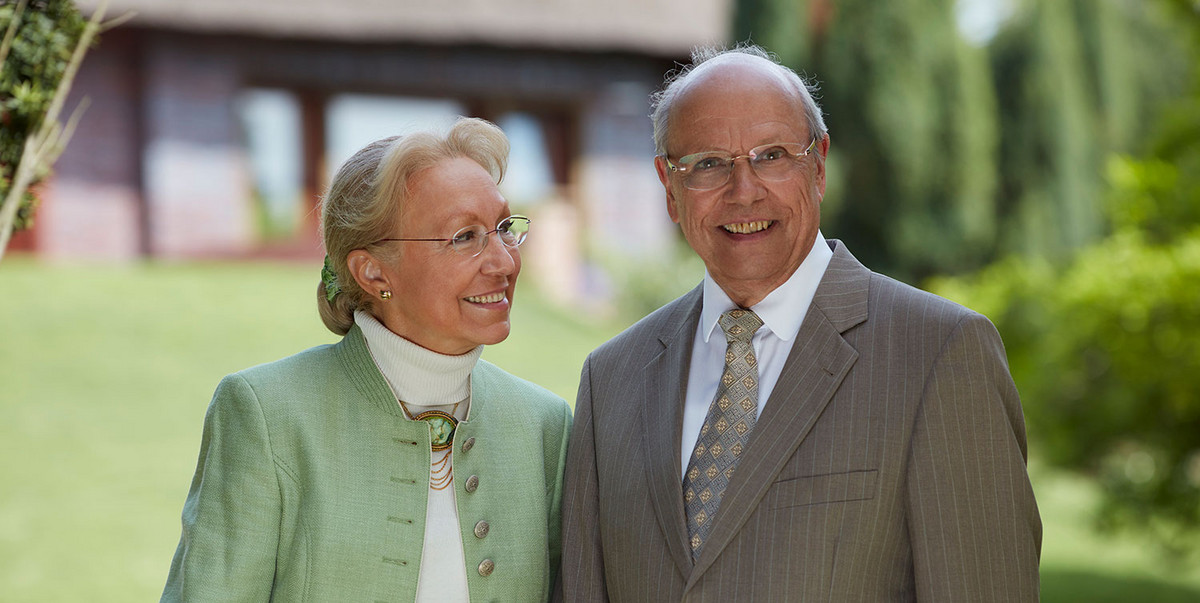
Since the 1970s, Peter Schnell has been among the most successful IT entrepreneurs in Germany. In 1969 he founded the Darmstadt Software AG, which he led until 1996, turning the company into one of the leaders in data processing.
“He always resisted hoarding money for wealth or power. Even in the company’s early days, wherever there was a need or something new coming, he was on hand with generous help,” recalled Dr Manfred Klett in his 2002 speech honouring Peter Schnell when the latter was awarded the golden “Medal for Merit for Foundations” by former President of Germany Johannes Rau on behalf of the Association of German Foundations.
According to his long-standing friend and pioneer of the Demeter movement, the entrepreneur’s economic success was always only the “means to a higher end”.
Archive material: SAGST and Association of German Foundations
About the Foundation
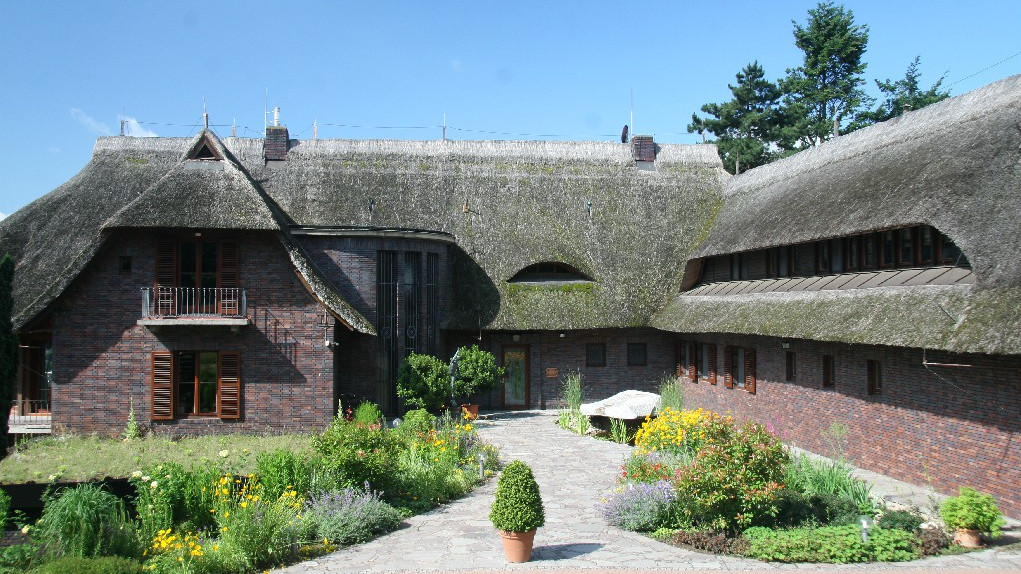
The foundation holds around 1.4 billion euros in assets and uses the profits to support projects run by independent charitable organizations in Germany, Europe, and – together with partners – Brazil. The projects we support directly and exclusively serve the common good. In addition, we see it as a special task to actively initiate projects that enable foundational and overarching developments and projects in keeping with the foundation’s charter.
Our foundation possesses its own asset management team whose investment strategy pursues ideological as well as financial goals, setting human beings and human development in central focus. In light of this background, we donate around 25 million euros per year, on average, to support various non-profit organizations as well as scientific advancement in the following areas:
Elementary Education
Elementary Education
With our grants in the area of elementary education, we want to make a contribution to ensuring that children are permitted to grow up healthy.
With this in mind, we promote non-profit preschool or crèche projects as well as inclusive and holistic approaches that focus on letting children be children. In concrete terms, SAGST supports independently run institutions that compassionately and attentively accompany the next generation’s mental, physical and spiritual development – in keeping with their age and personality – and advise parents on educational issues. Concepts that stimulate sensory experiences, make sustainable connections tangible in the truest sense of the term and enable the experience of spirituality and self-efficacy are particularly eligible for funding – especially in precarious social settings. Such initiatives emphasise community, social relationships and security, as well as exercise, nutrition and proximity to nature.
We also fund scientific studies addressing the current challenges that modern society poses to our children. The aim is to encourage discourse on these issues in science and among the general public. One focus is currently on media consumption by young children and adults and its consequences for child development and family bonding. Measures to train the next generation of educators and to increase the attractiveness of the profession are also part of SAGST’s funding spectrum.
Assistance for the elderly
Assistance for the elderly
In this area of funding, we see it as our task to support initiatives that develop future-oriented ways of addressing the challenges of an increasingly aging society. Besides the general demographic trends, we observe that, with an increasing tendency towards individualization, supportive family communities, as well as neighborly frameworks, marked by residents looking after one another, are increasingly being dissolved.
Against this background, we, as a foundation, are on the lookout for organizations with exemplary projects that foster social cohesion among the general population and develop supportive services for a dignified life for senior citizens. For us, innovative approaches emerge especially from projects that are involved with being an advocate for the interests of senior citizens, and, in the process, in particular aim at new forms of activities which span the generations, as well as mutual support.
Such inclusive and welfare-oriented model projects are born through civic involvement. A new culture focused on senior citizens living with confidence and joy, which is guided by a holistic understanding of man, the way SAGST encourages it, views life as an elderly person as a phase that is of particular importance, for both the personal resumé and for social coexistence. This can only come to fruition in a situation of mutual exchange, i.e. by all those involved in the social sphere both giving and taking.
Assistance for individuals with disabilities
Assistance for individuals with disabilities
In this area of funding we aim to promote projects that are driven by a holistic understanding of man. Such initiatives recognize the individuality of people who have a need for aid. They strive, through the help offered, to attain the highest possible degree of self-determination, as well as social participation for this fine body of men.
We fund, for instance, projects of non-profitable organizations on the topics of “Living”, “Education”, “Training”, “Employment” and “Care”, as well as scientific investigations that are expected to be of practical benefit to people with a need for assistance. Not only do these projects place value on the development of sustainable relations between people with and without a need for aid (social space orientation), but they also take notice of the individual with his or her personal destiny, his or her unique resumé and his or her capabilities and needs (focusing on the person). Based on inclusive concepts, the aim is to in particular support individuals with a need for assistance in co-shaping their community, participating in society and being able to make a difference in it.
Integrative/Anthroposophical medicine
Integrative/Anthroposophical medicine
Our aim is to make anthroposophical medicine, seen as a complement to conventional medicine, accessible to as wide a circle of patients as possible.
For this to happen, complementary healing therapies must have a research and university presence, and complementary medicine must be able to engage in discourse with conventional medicine. In light of this, we support the qualification of scientists in this field by funding post-docs as well as endowed chairs and professorships at various universities. Another focal area is supporting the training of anthroposophical doctors.
These efforts require a long-term and multi-layered perspective, which is why this area of support is a focal area of the foundation.
Children and youth
Children and youth
When it comes to child and youth welfare, we are dedicated to providing grants that support young peoples’ individual personal development and journey toward autonomy.
To this end, we partner with recognised independent non-profit organisations in this field, providing financial resources to develop programmes that foster healthy physical, mental and spiritual development while also providing support to parents and guardians. Our approach prioritises holistically oriented initiatives that stimulate sensory perception and creativity, establish sustainable connections, foster a sense of community and purpose or self-efficacy, and prepare children and youth for an increasingly digital world in an age-appropriate manner. Our focus is explicitly on measures to enhance the participation opportunities of all children, young people and young adults, including those with and without special needs, who are growing up in precarious social environments or are affected by illness or trauma.
Furthermore, we allocate funding to contribute to scientific research addressing the challenges faced by children and adolescents, particularly regarding the use of screens and their impact on health.
Nature and agriculture
Nature and agriculture
We support the use and shaping of nature by humans. This should on one hand preserve humans’ relationship with nature, and on the other hand sustain the natural world to ensure the basis of life for future generations. Forms of nature conservation that isolate human beings from nature are not among our support goals.
In this area, we concentrate as a foundation on researching and applying living contexts, as well as on training biodynamic agricultural practices. Special areas of interest include soil fertility and seeds, keeping and breeding plants and animals suitable for organic or biodynamic farming (without genetic engineering), as well as increasing the quality of food to enable the healthy nourishment of body, soul, and spirit.
Existing research methods in this area should be adapted and expanded by developing new approaches that do justice to the living core of the natural world, and which are not limited to its material side.
Schools
Schools
As central places of learning and life, schools bear responsibility for the healthy personal development of young people. They provide guidance during the school years and beyond, help children and youth to form competencies for the future and prepare them for the challenges of living in a society changing with ever-increasing speed. To this end, schools impart values and knowledge as well as social skills and practical life experiences. Schools as institutions are also subject to permanent change, as they must respond to the changing and sometimes very heterogeneous worlds of the adolescents entrusted to them, taking into account the family context and creating educational equity.
It is with this in mind that SAGST funds requests from independent school authorities that realise concepts or model projects for the pedagogy of the future, dismantle educational barriers wherever possible and establish the environment as the third educator. There is a special focus on reform pedagogical approaches and their further development. Since the very beginning, these have been a major focus of SAGST’s funding activities, supporting schools during the start-up phase as well as throughout their development process. We also expressly back independent educational institutions that want to take on the risks and opportunities of digital media culture in a development-oriented way or that enable encounters outside the classroom. Similarly, funding is available for preventive health and nutritional educational measures, as well as ideas that strengthen mental and physical resilience and ensure a positive school climate (see flyer “Revention & Health”). In the contexts mentioned above, training and continuing education for teachers within the school organism are just as eligible for funding as research or extracurricular evaluation projects that, for example, encourage the contemplation of teaching and the image of teachers.


